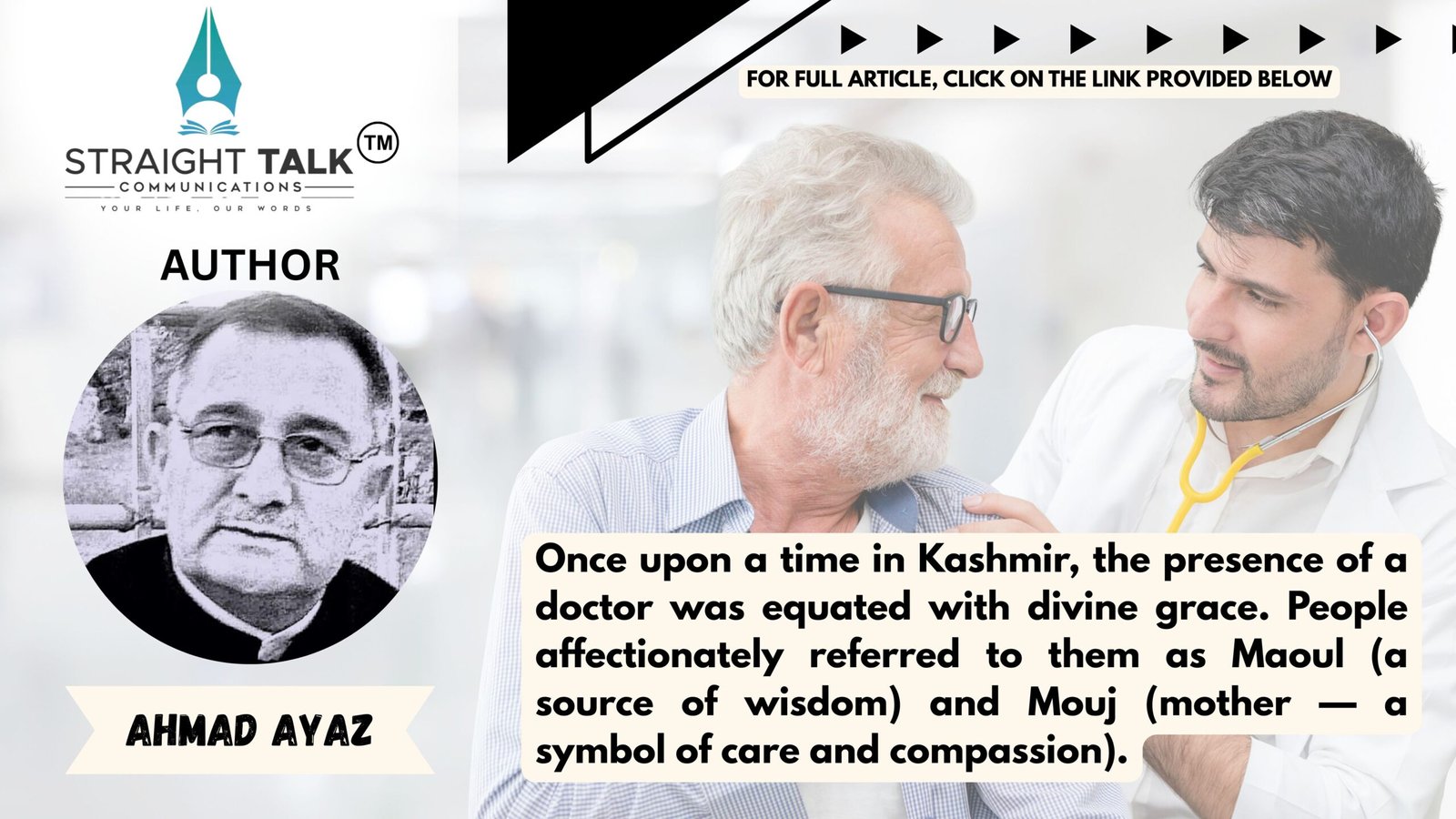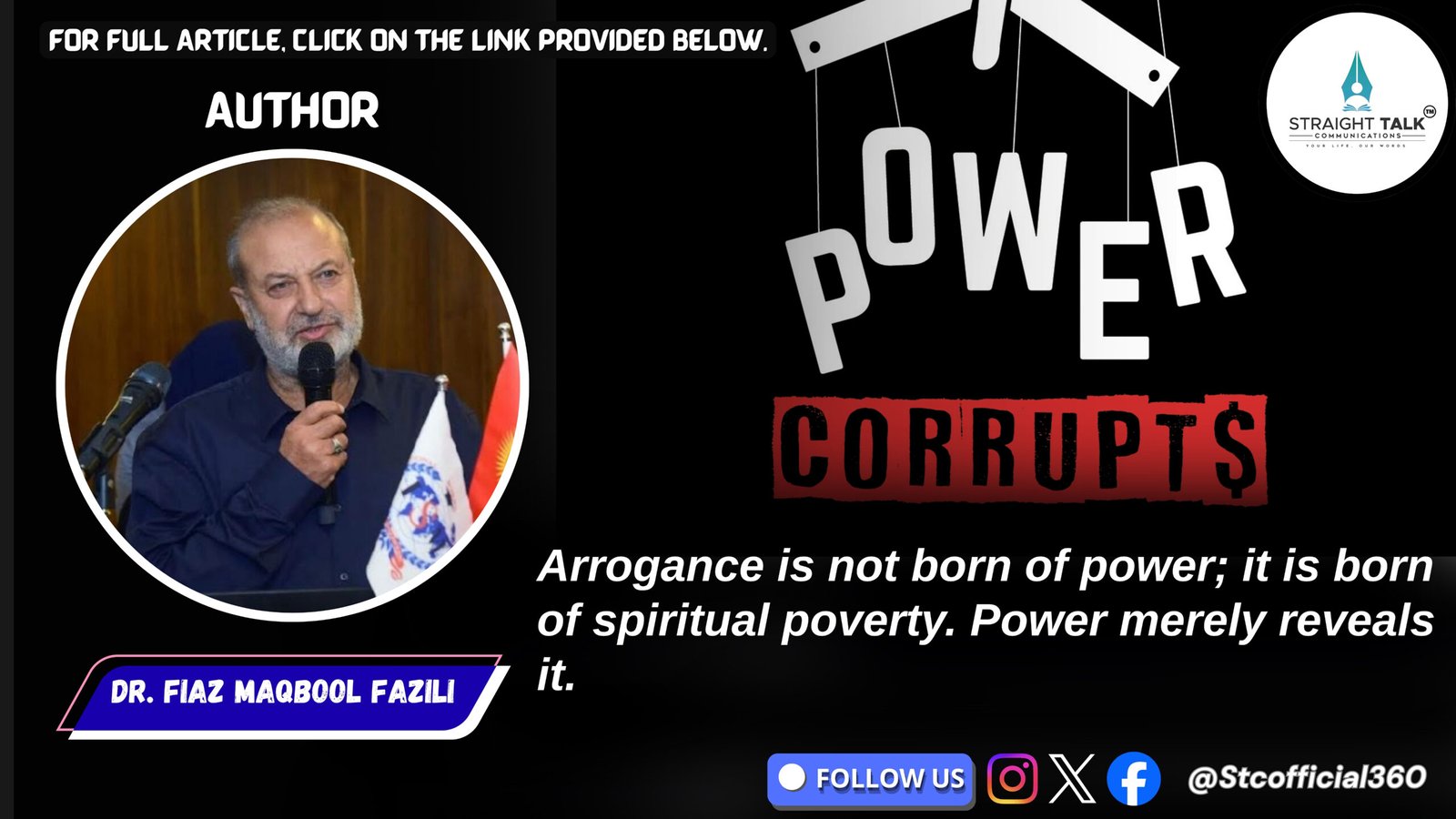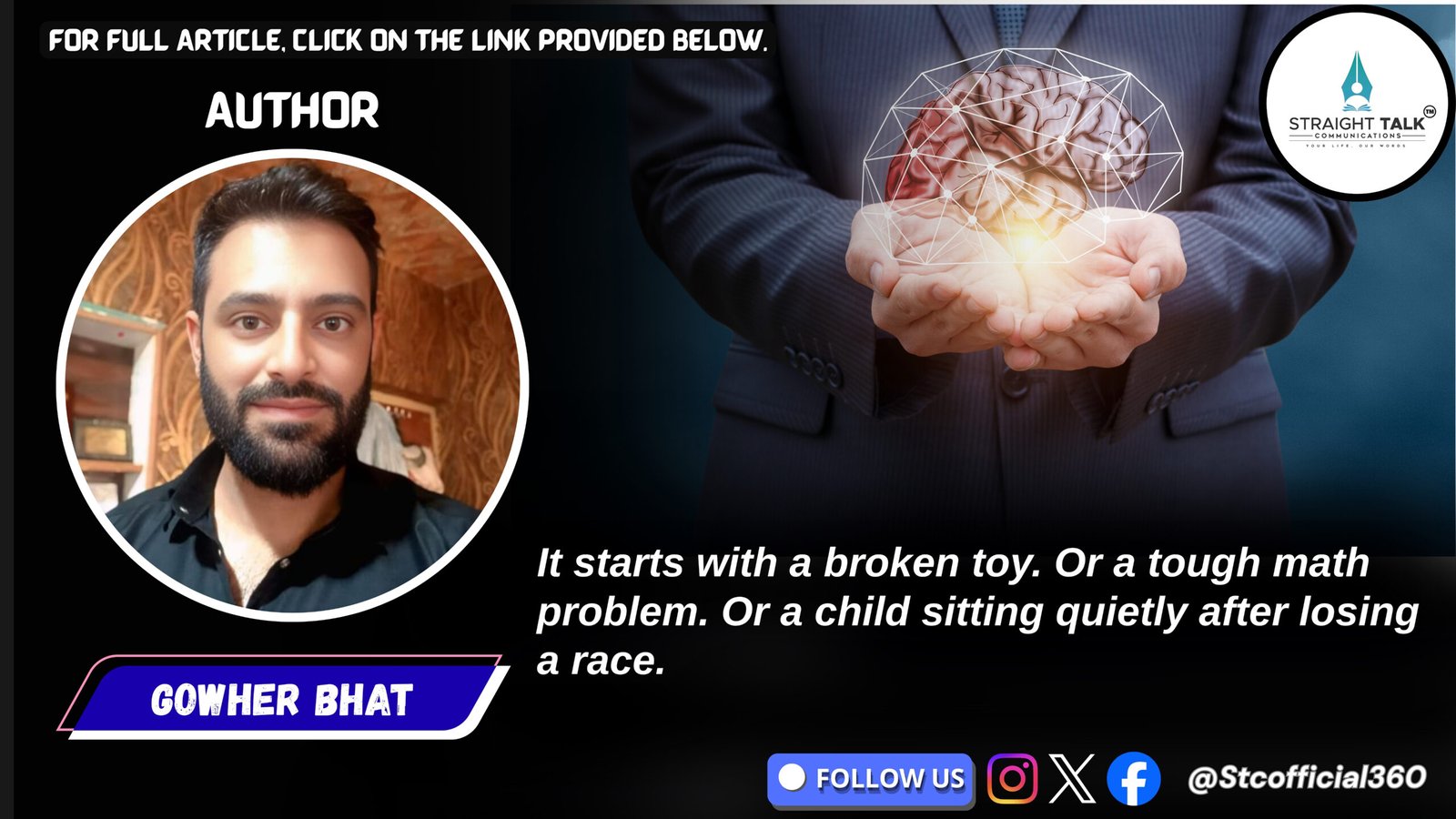FROM REVERENCE TO MISTRUST: THE CRISIS OF MEDICAL ETHICS IN KASHMIR

Once upon a time in Kashmir, the presence of a doctor was equated with divine grace. People affectionately referred to them as Maoul (a source of wisdom) and Mouj (mother — a symbol of care and compassion). These weren’t mere honorifics, but heartfelt expressions of cultural respect and emotional connection. Doctors were seen not just as healers of the body but as custodians of dignity, empathy, and hope. Their presence brought comfort; their word, final.
Today, however, that sacred bond is fraying.
Mistrust has crept in where reverence once lived. Patients now approach government hospitals with anxiety, not assurance. And while many doctors — especially senior ones — continue to serve with integrity, an unsettling trend of negligence, ethical lapses, and indifference has begun to erode public confidence, particularly in the government-run healthcare sector.
This article explores the shifting perception of the medical profession in Jammu and Kashmir and outlines a way forward to rebuild the trust that once defined the doctor-patient relationship.
A Tradition Rooted in Reverence
In traditional Kashmiri society, doctors were revered as more than professionals — they were seen as moral beacons and emotional anchors. The terms Maoul and Mouj reflected not only gratitude for medical help but a spiritual acknowledgment of the healer’s role in society.
People from far-flung villages would travel long distances to seek their guidance. Often, consultation fees were nominal, and the value of a doctor’s attention was measured not in rupees but in blessings and respect. The white coat symbolized humility, not authority.
For many doctors of earlier generations, medicine was a calling — a mission grounded in service, not status.
The Erosion of Trust
Over time, however, several systemic and behavioral shifts have led to a growing distrust in the medical profession across J&K. The deterioration is especially visible in public hospitals, where the stakes are highest and the resources lowest.
1. Rise in Medical Negligence
Cases of misdiagnosis, delayed treatment, and even avoidable fatalities have become increasingly common. Many patients feel reduced to files — not people — in overcrowded outpatient departments and emergency wards.
Junior doctors, often the first point of contact, are accused of inattentiveness and superficial assessments. While inexperience plays a role, the more dangerous factor is often indifference or the absence of accountability.
2. Frequent Strikes and Service Disruptions
Doctors, like all professionals, have the right to protest — whether about transfers, salaries, or working conditions. But the frequency and scale of strikes today, even affecting emergency and maternal services, are alarming.
Such disruptions disproportionately impact the poor, who rely solely on public hospitals. Earlier, symbolic protests coexisted with patient care. Today, service withdrawal has become a negotiation tool — and it’s eroding whatever faith remains among the public.
3. Violations of Privacy and Medical Ethics
The recent viral video from LD Hospital, Srinagar — where a childbirth was recorded without the patient’s consent — shocked many. It wasn’t just a breach of protocol; it was a violation of basic human dignity.
Such incidents point to a disturbing ignorance of medical ethics, particularly among younger professionals. Recording a vulnerable patient without consent is not merely irresponsible — it is a moral and legal failure that demands institutional introspection and accountability.
Young Doctors: Between Promise and Peril
It would be unfair to paint all young doctors with the same brush. Many are sincere, hardworking, and driven by a genuine desire to serve. They work long shifts in difficult conditions and do their best despite systemic limitations.
Yet, a troubling pattern of detachment and entitlement is also emerging among a section of younger professionals. Some contributing factors include:
Lack of Mentorship: Many junior doctors are thrown into high-pressure environments with minimal supervision or guidance.
Neglect of Ethics in Education: Medical curricula often prioritize technical expertise over ethical grounding and communication skills.
Systemic Burnout: Long hours, poor infrastructure, and lack of mental health support leave many doctors exhausted and emotionally distant.
Misplaced Motivation: For some, the profession is seen more as a route to social prestige and income than as a public service.
The Enduring Example of Senior Doctors
Despite these challenges, many senior doctors in Kashmir continue to embody the values that once defined the profession. They take time to listen, explain, and comfort. They respond with calm in chaos and stand firm during crises.
For them, medicine remains a vocation — not a job. Their work is guided by integrity, not incentives. These individuals should be celebrated, and their values institutionalized as part of formal mentoring programs in hospitals and medical colleges.
The Government’s Role: From Neglect to Reform
The crisis of trust in public healthcare isn’t just about doctors. It reflects a broader institutional failure. The Government of Jammu and Kashmir must step forward with serious, sustained reforms to rebuild public confidence.
1. Strengthen Ethical Training
Medical colleges must introduce structured modules on ethics, empathy, and communication. Real-life simulations and patient-centered roleplays can help future doctors internalize these values.
2. Build Accountability Mechanisms
Establish a transparent, time-bound grievance redressal system for public complaints. Doctors found guilty of negligence or misconduct should face disciplinary action — not just routine transfers.
3. Enforce Privacy and Consent Protocols
Hospitals must prominently display patient rights and enforce strict guidelines against unauthorized recordings or disclosures. Violations should be met with swift and visible penalties.
4. Improve Working Conditions
Doctors deserve fair treatment too. Staffing shortages, crumbling infrastructure, delayed promotions, and lack of rest facilities demoralize professionals. Better infrastructure and incentives — especially for rural postings — can go a long way in restoring morale.
5. Recognize and Reward Integrity
Create institutional mechanisms to acknowledge ethical and exemplary service. Let honest, compassionate doctors be the faces of leadership and change. Let their stories inspire future generations.
Rebuilding the Doctor-Patient Relationship
At its core, healthcare is a deeply human act. The doctor-patient relationship is built on trust, dignity, and confidentiality — and once broken, no amount of technology or funding can restore it.
For that trust to return:
Doctors must honor their oath. The Hippocratic Oath is not ceremonial; it is a lifelong moral contract.
Patients must show restraint. While unethical behavior must be called out, violence or abuse against doctors only worsens the crisis.
Media and civil society must act responsibly. Exposing malpractice is essential — but celebrating those who serve selflessly is just as important.
A Call to Action
The LD Hospital incident should not be treated as an isolated embarrassment — it must be a wake-up call. The Health Department must take concrete steps, such as:
Conducting surprise audits for ethical compliance
Implementing transparent transfer and appointment policies
Establishing anonymous patient feedback systems
Mandating annual re-certification in medical ethics and privacy laws
If we fail to act now, the white coat risks becoming a symbol not of reassurance but of fear. Not of healing, but of hierarchy.
CONCLUSION: Rekindling the Spirit of Mouj and Maoul
It’s time to remember what once made medicine a sacred profession in Kashmir — its deep foundation in humanity. Skill without compassion is dangerous; knowledge without humility is hollow.
In a region frequently facing crisis and instability, an ethical, empathetic healthcare system is not a luxury — it is a lifeline. For many people, doctors are the first and only face of the state during moments of personal emergency.
Let that face radiate care — not coldness. Let it bring assurance — not anxiety.
Let us restore the spirit of Mouj and Maoul — so that the next generation of doctors in Kashmir are once again known not just by their degrees, but by their dignity, dedication, and deep respect for life.
(The author is a freelancer, national TV debater, and columnist. Views expressed are personal. He can be reached at ahmadayaz08@gmail.com.)







